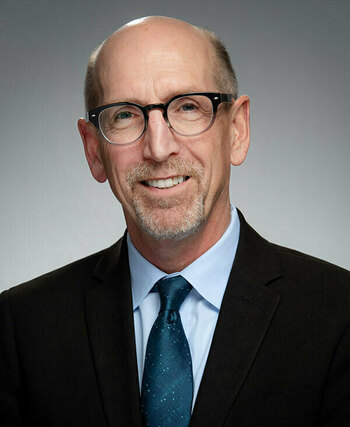
Students sometimes laugh nervously on the first day of class when professor John Duffy tells them that his goal is to change their lives.
It’s not an ego-driven statement; Duffy thinks every class at Notre Dame should expand their vision, at least somewhat.
“I’m not the type of teacher who jumps on desks and recites ‘O Captain! My Captain!’,” said Duffy, the William T. and Helen Kuhn Carey Professor of Modern Communication in the Department of English. “But wouldn’t students be disappointed if, after 15 weeks of close, intense engagement with texts and with one another, they were exactly the same person, thinking in the exact same way?”
Duffy has been achieving his goal at Notre Dame for more than 20 years now, making a genuine and lasting impression on students and colleagues that’s evident in the nomination letters that resulted in him receiving the 2022 Sheedy Excellence in Teaching Award, the highest teaching honor in the College of Arts & Letters.
Corinne Viglietta ’06, now the program officer for teacher development at Johns Hopkins Center For Talented Youth, said Duffy inspired her to adopt that same perspective on the power of education. An English and French major, she initially went for help at the Writing Center that Duffy founded at Notre Dame, then ended up working there as a tutor.
“Almost two decades on, I am still uncovering the many ways John Duffy changed my life and, by extension, the lives of the hundreds of thousands of teachers and students with whom I have had the honor of working,” she wrote in recommending Duffy for the award.
“John taught us how to engage others — especially those whose voices have been suppressed or excluded — in the ongoing human conversation of words and ideas. He taught us how to use language as a force for good, and he made us want to change the world.”
“John taught us how to engage others — especially those whose voices have been suppressed or excluded — in the ongoing human conversation of words and ideas. He taught us how to use language as a force for good, and he made us want to change the world.”
Rewarding relationships
Duffy will receive the Sheedy Award and deliver remarks at a ceremony at 3:30 p.m. Wednesday, Dec. 7, in McKenna Hall. Created in 1970, the award is named for Rev. Charles E. Sheedy, C.S.C., dean of the College from 1952 to 1968. Awardees demonstrate sustained excellence in research and instruction, the ability to motivate and enrich students with innovative and creative teaching methods, and the power to influence teaching and learning.
For years, Duffy said, he has admired his colleagues’ witty and sage Sheedy Award acceptance addresses. Now he’s crafting his own.
It helps that speech-giving is in his wheelhouse; Duffy teaches courses titled Great Speeches and The Art of Public Speaking. He also teaches Writing and Rhetoric, Reading The 1619 Project, Literature of Disability, and many others.
Outside of class, Duffy— who has authored five books and is now working on a textbook — also shares his expertise in lectures at colleges around the country, and is a faculty fellow with the Klau Center for Civil and Human Rights and Initiative on Race and Resilience.
While the power of words and language has long been at the forefront of his mind, his path to teaching and writing about it at Notre Dame was unconventional.

After completing master’s degrees in Anglo-Irish studies from University College Dublin and applied linguistics from Teachers College, Columbia University, for five years he worked in refugee camps in Southeast Asia, then worked in Wisconsin as an advocate for Hmong immigrants from Laos.
He earned his Ph.D. in English at the University of Wisconsin, then came to Notre Dame in 1999 to found and direct the University Writing Center, which is dedicated to helping scholars — from first-years to advanced graduate students in every discipline — become better writers.
The individualized sessions cover all stages of the writing process, including developing a thesis, constructing arguments, organizing the paper, and revising drafts.
“I just loved that type of pedagogy — 1-to-1 non-evaluative talk about writing,” he said. “I found it enormously rewarding.”
Duffy went on to serve as the O’Malley Director of the University Writing Program, which teaches fundamentals of writing effective, evidenced-based, and ethical arguments in a variety of genres to first-year students through Writing and Rhetoric courses. And he was the Joseph Morahan Director of the College Seminar Program — a required interdisciplinary course for Arts & Letters students that focuses on analytic skills, intellectual flexibility, and verbal communication.
In his 23 years on campus in a variety of roles, Duffy has cherished the lasting bonds he’s formed with students and faculty.
“What’s most rewarding are the relationships with students in the classroom when we’re working toward understanding an idea or text or trying to come to terms with a question,” he said. “And it’s rewarding getting to know colleagues at Notre Dame. Being around brilliant people is a gift.”
Unrivaled commitment
Duffy’s students and his colleagues at the University, and beyond, feel similarly about him.
One student in his nomination letter described the “once-in–lifetime academic experience” of Duffy’s first-year seminar on The 1619 Project, the magazine issue and book by Notre Dame alumna Nikole Hannah-Jones ’98, a New York Times journalist and Pulitzer Prize-winning author.
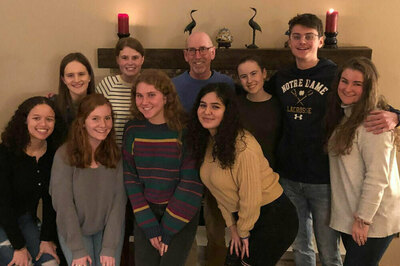
The student described Duffy as a father figure who is the first person students think of when they want guidance in academia or life. The class, the student said, motivated him to want to earn a doctorate in Africana studies and become a professor who inspires students the way Duffy inspired him.
“He is one of the greatest human beings I have ever had the pleasure of meeting,” the student wrote.
That’s a familiar sentiment.
Patrick Clauss, who succeeded Duffy as the O’Malley Director of the University Writing Program, said when they walk together to meetings across campus, they need to build in extra time. Because when Duffy’s students — current and former — spot him, “without fail they rush over to chat.”
“John remembers their names and details about their majors, their previous essay and speech topics, and their academic and personal accomplishments,” Clauss wrote in his letter of recommendation.
“Touching countless lives at the University, he is not only one of the smartest teachers I know but also one of the kindest, most compassionate, and most inspiring, as well. John’s commitment to his students is unrivaled.”
Knowledge unlocked
Duffy knows firsthand that education can be transformative.
Describing himself as an aimless high school student, Duffy fondly recalls a history teacher, James Kinnier, who showed him kindness and respect. He was the first educator genuinely interested in what Duffy had to say.
“He would truly listen to my answers. It was a revelation,” Duffy said. “This opened up a whole new way of thinking about learning for me, and that was the first time I thought seriously about becoming a teacher.”
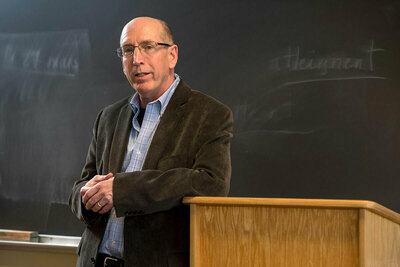
In a powerful account Duffy wrote in Notre Dame Magazine this fall, he detailed a formative moment in his first semester of college while wandering the school library stacks for the first time. Unsure of his major, he happened upon poet John Keats’ sonnet “On First Looking into Chapman’s Homer."
Reading the final lines of the poem, he wrote, sent a shiver up his spine. He kept reading poetry and analysis until early in the morning, and left the library knowing he wanted to be an English major.
Stories like his, he said, are a reminder that faculty don’t always know what will unlock students’ passions for learning. To be a successful teacher, it’s crucial to stay connected to who students are and what they’re experiencing.
“We can’t assume what we’re doing will always work, no matter what. It can’t be rinse-and-repeat,” he said. “The challenge is to figure out where the students are today and be responsive to that.”
Now, Duffy also teaches teachers.
When Doug Hesse, executive director of writing at the University of Denver, organized The Futures of College Writing symposium in 2017, he invited three top theorists and practitioners in the field, “people whose cutting-edge ideas are most profoundly shaping the profession.”
One was Duffy, “whose ideas about writing, ethics, and civic discourse have rightfully been embraced by teachers and scholars in hundreds of colleges and universities,” Hesse wrote in his nomination letter.
“Professor Duffy’s generous and thoughtful contributions to that symposium made clear how the compelling man in person matched the compelling man in print. He is original, influential, and highly respected.”
“We can’t assume what we’re doing will always work, no matter what. It can’t be rinse-and-repeat. The challenge is to figure out where the students are today and be responsive to that.”
Intellectual generosity
Duffy also applies his expertise in ethical discourse to improve the health of the republic.
In his 2020 book Provocations of Virtue: Rhetoric, Ethics, and the Teaching of Writing, he examines the role that writing teachers and scholars have in counteracting what he calls the violent and dishonest political discourse in America. Writing programs at Notre Dame and other universities can offer a different model of discourse based on truthfulness, accountability, open-mindedness, generosity, and intellectual courage.
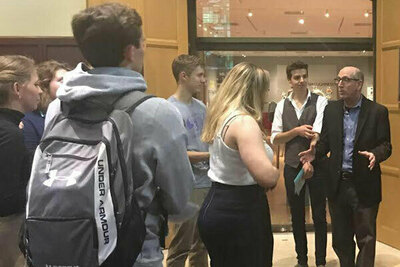
“We teach students that it’s not enough to make a claim, you have to provide evidence … which demonstrates that you’re accountable and answerable for the things you say. It’s a statement of your integrity,” he said. “We teach students they almost always are required to consider an alternative point of view, which calls for open-mindedness, for intellectual generosity, which can cause you to change your mind.”
This model enables relationships to thrive and provides the materials for a healthier, more constructive public discourse, he said. And with about 4 million college students annually enrolled in first-year writing programs nationwide, Duffy said, a better democracy might yet result.
In further pursuit of that, he founded the nonpartisan Write to Vote Project, in which college students write letters and op-eds in support of democracy by encouraging civic engagement and advancing voting rights.
“It’s not a question of Republican or Democrat,” he said. “It's a question of truthfulness and a commitment to the common good.”
Uncommonly gracious
Throughout their nomination letters, students, alumni, and colleagues detailed how Duffy had shaped their lives and empowered them to want to change the world, too. He did so, they wrote, by listening with an open mind, learning alongside them, and by being unfailingly generous with his talents and time.
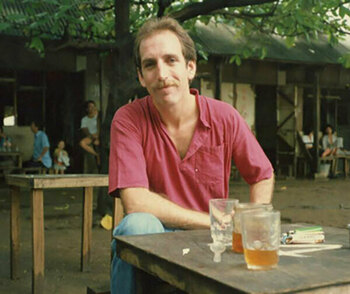
A common sentiment was that Duffy is uncommonly gracious — that he’s without peer as a professor because he makes people around him a priority. One writer shared that Duffy is “the paragon of the very virtues he teaches.”
Duffy learned about empathy and humility during his own academic journey. And he learned a lot about teaching and perseverance while working at a refugee camp in the Philippines, where he supervised instructors who taught English to refugees from Vietnam, Cambodia, and Laos.
“I met people who had been through trauma and crisis and had lost everything, including family,” he said. “But, yet, they were resolute and optimistic about the future and determined to succeed.”
The call to teach — and the connective power of the relationships that education forms — have carried him around the world, and carried him through every course he’s offered at Notre Dame.
"It's been a joyful ride,” he said. “I’m doing exactly what I was meant to do.”
"It's been a joyful ride. I’m doing exactly what I was meant to do.”


